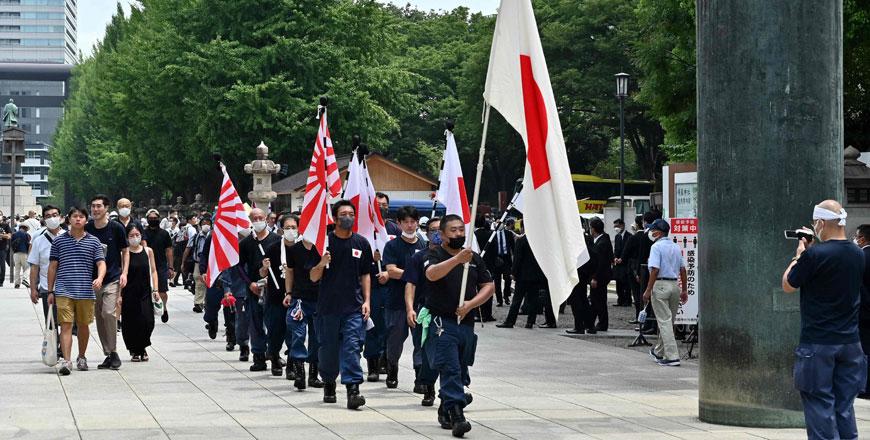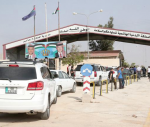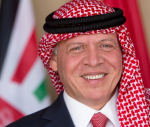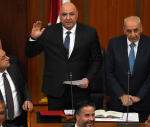You are here
Japanese ministers visit Yasukuni Shrine, first since 2016
By AFP - Aug 15,2020 - Last updated at Aug 15,2020
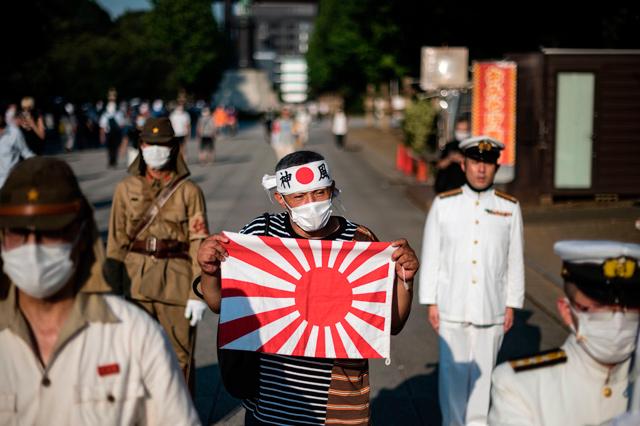
A man holds a Rising Sun flag amongst others wearing period Japanese Imperial Army and Navy uniforms outside the Yasukuni shrine in Tokyo on Saturday, on the 75th anniversary of Japan’s surrender in World War II (AFP photo)
TOKYO — Four Japanese Cabinet ministers paid their respects on Saturday at a war shrine seen by neighbouring countries as a symbol of Tokyo’s past militarism, in the first such visit since 2016.
Nationalist Prime Minister Shinzo Abe sent a ritual cash offering to the Yasukuni Shrine in central Tokyo to mark Saturday’s 75th anniversary of Japan’s surrender in World War II but was not expected to visit in person, local media said.
Yasukuni honours 2.5 million war dead, mostly Japanese, who perished in the country’s wars since the late 19th century.
But it also enshrines senior military and political figures convicted of war crimes by an international tribunal after the war.
Education Minister Koichi Hagiuda, one of the four ministers to visit the shrine, said he did so to pay tribute to the war dead.
“I paid respects... to the souls of those who nobly sacrificed themselves during the war,” Hagiuda told reporters.
The three others were Environment Minister Shinjiro Koizumi, Internal Affairs Minister Sanae Takaichi, and Seiichi Eto, minister in charge of territorial issues.
Abe last visited the shrine in December 2013 to mark his first year in power, sparking fury in Beijing and Seoul and earning a rare diplomatic rebuke from close ally the United States.
This year’s visits come with tensions still high between Japan and South Korea — one of the countries that suffered most from Japan’s wartime military atrocities.
The two countries have issued reciprocal trade sanctions and threats as they battle over issues including wartime forced labour and sex slavery.
Seoul is “ready to sit face to face at any time” with Tokyo to discuss historical disputes, South Korean President Moon Jae-in said in an address commemorating the country’s liberation from Japanese colonial rule in 1945.
The issue of forced labour has been a thorny issue between the two neighbours, with Tokyo saying all reparation claims were settled in a 1965 treaty that normalised relations with financial contributions.
But the South Korean supreme court ruled in 2018 that victims had a right to seek compensation. Moon’s government has said it respects the ruling and will seek a “smooth resolution” with Japan.
“The door for consultations is still wide open,” Moon said in his Saturday speech.
‘Correctly’
remembering WWII
Later in the day, Emperor Naruhito and Empress Masako attended a national ceremony to mark the anniversary, which had been scaled back because of the coronavirus.
“Looking back on the long period of post-war peace, reflecting on our past and bearing in mind the feelings of deep remorse, I earnestly hope that the ravages of war will never again be repeated,” said Naruhito, who took the throne in May last year from his father Akihito.
Naruhito was born well after the conflict and has spoken of the need to “correctly” remember World War II, without downplaying Japan’s early-20th-century militarism.
It was his grandfather Hirohito who announced Japan’s defeat on August 15, 1945, in an unprecedented radio address that was the first time the country’s citizens had heard the monarch’s voice.
Related Articles
TOKYO — Two Japanese ministers paid respects Monday at a controversial war shrine, infuriating China and South Korea where the site is seen
US President Barack Obama assured ally Japan on Thursday that Washington was committed to its defence, including of tiny isles at the heart of a row with China, but denied he had drawn any new “red line” and urged peaceful dialogue over the islands.
JAKARTA — Japan’s Emperor Naruhito and Empress Masako arrived in the Indonesian capital Jakarta on Saturday for their first state visit sinc


